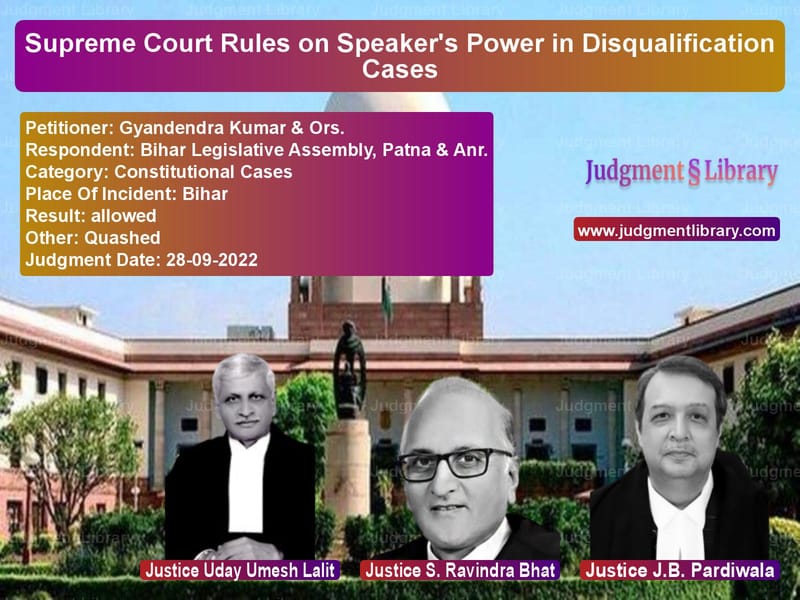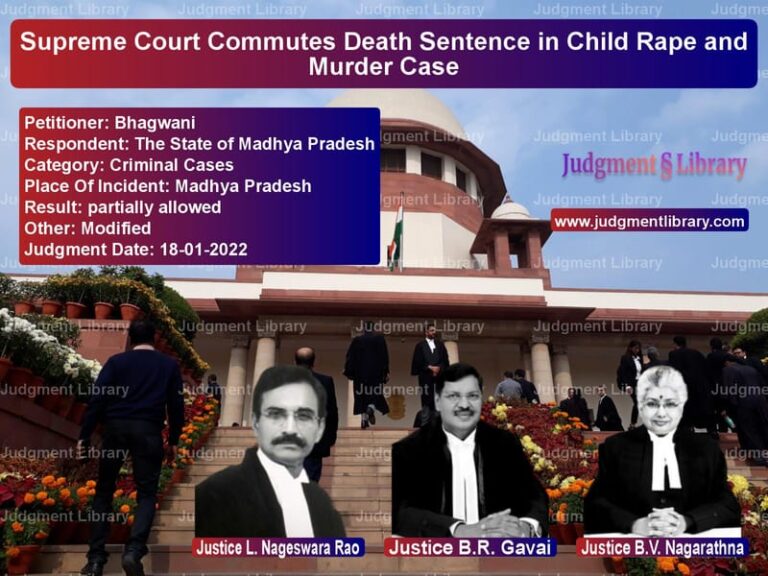Supreme Court Rules on Speaker’s Power in Disqualification Cases
The disqualification of legislators under the Tenth Schedule of the Constitution of India has been a subject of legal scrutiny for decades. In the case of Gyandendra Kumar & Ors. v. Bihar Legislative Assembly, the Supreme Court examined whether a Speaker has the power to impose additional restrictions beyond disqualification, such as barring a legislator from contesting elections. The Court ruled that such additional penalties are unconstitutional and set aside the Speaker’s directions.
Background of the Case
The case arose from the disqualification of four members of the 15th Bihar Legislative Assembly—Gyanendra Kumar Singh, Rahul Kumar, Ravindra Rai, and Neeraj Kumar Singh—by the then Speaker. The disqualification order was passed on November 1, 2014, under Paragraph 2(1)(a) of the Tenth Schedule of the Constitution, which pertains to anti-defection provisions.
The Speaker’s order not only disqualified these members but also barred them from contesting elections and stripped them of all facilities granted to ex-members of the Assembly.
Legal Issues Raised
- Did the Speaker have the authority to impose restrictions beyond disqualification?
- Were the disqualified members entitled to legal relief since the Assembly had already been dissolved?
- Was the Speaker’s order consistent with constitutional provisions and past Supreme Court rulings?
Arguments by the Petitioner (Disqualified MLAs)
The appellants argued that:
- The Speaker had exceeded his powers by barring them from contesting elections.
- The Tenth Schedule only provides for disqualification and does not empower the Speaker to impose additional penalties.
- The order of disqualification itself was questionable, but since the Assembly had been dissolved, they were not challenging it.
- They relied on the Supreme Court’s ruling in Shrimanth Balasaheb Patil v. Speaker, Karnataka Legislative Assembly (2020), where the Court held that a Speaker cannot impose additional restrictions beyond disqualification.
Arguments by the Respondent (Bihar Legislative Assembly)
The Bihar Legislative Assembly contended that:
- The Speaker was well within his powers to take actions that ensure political stability and prevent defections.
- The disqualified members had violated the party’s directives and their actions warranted a strict penalty.
- The Speaker’s decision was taken in the best interest of maintaining the democratic fabric of the Assembly.
Supreme Court’s Observations
A three-judge bench comprising Chief Justice Uday Umesh Lalit, Justice S. Ravindra Bhat, and Justice J.B. Pardiwala made the following key observations:
1. Speaker Cannot Impose Additional Restrictions
The Court cited its ruling in Shrimanth Balasaheb Patil and held:
“The Speaker does not have the power either to indicate the period for which a person would stand disqualified nor to bar someone from contesting elections.”
The Tenth Schedule only allows the Speaker to declare a member disqualified from the Assembly and does not extend to banning them from future elections.
2. The 15th Bihar Legislative Assembly No Longer Exists
Since the term of the 15th Bihar Legislative Assembly ended in 2015 and the 17th Legislative Assembly was currently in session, the Court found it unnecessary to examine the validity of the disqualification itself. Instead, it focused on the Speaker’s authority in imposing additional penalties.
3. Supreme Court’s Power to Set Aside Unconstitutional Directions
The Court ruled that since the Speaker’s directions exceeded his constitutional mandate, they must be set aside:
“The Speaker was not within his jurisdiction to issue directions other than those pertaining to disqualification.”
As a result, all directions issued in paragraph 28 of the Speaker’s order—except the disqualification itself—were struck down.
Final Judgment
The Supreme Court ruled:
- The directions issued by the Speaker beyond disqualification were set aside.
- Since the Assembly was already dissolved, no further action was necessary regarding the disqualification.
- The judgment in Shrimanth Balasaheb Patil was reaffirmed, preventing Speakers from imposing additional disqualification periods.
Key Takeaways from the Judgment
1. Speaker’s Powers are Limited to Disqualification
The ruling confirms that a Speaker cannot bar disqualified members from contesting elections. Their role is restricted to deciding whether an MLA is disqualified under the Tenth Schedule.
2. Importance of Constitutional Limits
The judgment reinforces the principle that constitutional authorities must function within their designated powers and cannot impose penalties beyond what is prescribed by law.
3. Protection of Electoral Rights
The decision safeguards the electoral rights of disqualified members by ensuring they can contest elections again unless otherwise restricted by law.
Conclusion
The Supreme Court’s ruling in Gyandendra Kumar & Ors. v. Bihar Legislative Assembly is a landmark judgment on the powers of the Speaker under the Tenth Schedule. By striking down additional penalties beyond disqualification, the Court has ensured that constitutional authorities remain within their jurisdiction and do not impose arbitrary restrictions on legislators. The ruling reaffirms the Court’s role as the guardian of constitutional principles, ensuring that due process is followed in matters of disqualification.
Petitioner Name: Gyandendra Kumar & Ors..Respondent Name: Bihar Legislative Assembly, Patna & Anr..Judgment By: Justice Uday Umesh Lalit, Justice S. Ravindra Bhat, Justice J.B. Pardiwala.Place Of Incident: Bihar.Judgment Date: 28-09-2022.
Don’t miss out on the full details! Download the complete judgment in PDF format below and gain valuable insights instantly!
Download Judgment: gyandendra-kumar-&-o-vs-bihar-legislative-as-supreme-court-of-india-judgment-dated-28-09-2022.pdf
Directly Download Judgment: Directly download this Judgment
See all petitions in Fundamental Rights
See all petitions in Legislative Powers
See all petitions in Judgment by Uday Umesh Lalit
See all petitions in Judgment by S Ravindra Bhat
See all petitions in Judgment by J.B. Pardiwala
See all petitions in allowed
See all petitions in Quashed
See all petitions in supreme court of India judgments September 2022
See all petitions in 2022 judgments
See all posts in Constitutional Cases Category
See all allowed petitions in Constitutional Cases Category
See all Dismissed petitions in Constitutional Cases Category
See all partially allowed petitions in Constitutional Cases Category







